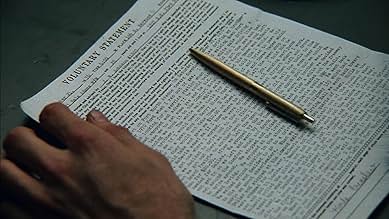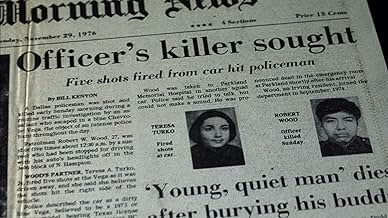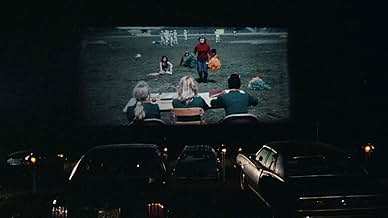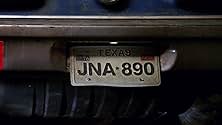IMDb-BEWERTUNG
7,9/10
27.072
IHRE BEWERTUNG
Ein Film, der erfolgreich argumentiert, dass ein Mann von einem korrupten Justizsystem in Dallas County, Texas, fälschlicherweise wegen Mordes verurteilt wurde.Ein Film, der erfolgreich argumentiert, dass ein Mann von einem korrupten Justizsystem in Dallas County, Texas, fälschlicherweise wegen Mordes verurteilt wurde.Ein Film, der erfolgreich argumentiert, dass ein Mann von einem korrupten Justizsystem in Dallas County, Texas, fälschlicherweise wegen Mordes verurteilt wurde.
- Auszeichnungen
- 12 Gewinne & 5 Nominierungen insgesamt
Empfohlene Bewertungen
Having seen two other Errol Morris documentaries, I expected that there would be a Philip Glass soundtrack, some flashy camera work, and perhaps some reenactments during 'The Thin Blue Line'. I have long struggled with my opinions on Morris' work, mainly because I am more of a purist when it comes to documentaries. I want to see footage, photographs, interviews, etc. that are going to back up a strong story, not a lot of camera angles, stark white backgrounds, and a post-modernist score.
'The Thin Blue Line' had the latter presentation, so I immediately was slightly turned off until the subject of the film was presented. The location is Dallas, and it is the 1970's. Late one night, a squad car pulls over a car that does not have its lights on, but as soon as the policeman reaches the driver's side door, he is shot several times and murdered. The car pulls away before the policeman's partner is able to ascertain the license plate number or even the exact make and model of the vehicle. What follows is a veritable witch hunt for the killer (or killers) that ends with one man in jail who is professing his innocence, and another man, a career criminal who gets away veritably scot-free. Through various interviews with the players involved; detectives, alleged eye-witnesses, the accused themselves, Morris seeks to find out the truth in a case that comes down to a 'he-said/he-said' situation.
'The Thin Blue Line' is expert film-making in the investigative sense. Morris does his job in presenting as many facts as possible. The case finally came to a head a couple of years after the film was finished, but it is documented as being instrumental in the reexamination of the facts. I still don't necessarily care for Morris' style, but it cannot be argued that 'The Thin Blue Line' is an excellent documentary, and that he definitely has an eye for picking very compelling subjects.
--Shelly
'The Thin Blue Line' had the latter presentation, so I immediately was slightly turned off until the subject of the film was presented. The location is Dallas, and it is the 1970's. Late one night, a squad car pulls over a car that does not have its lights on, but as soon as the policeman reaches the driver's side door, he is shot several times and murdered. The car pulls away before the policeman's partner is able to ascertain the license plate number or even the exact make and model of the vehicle. What follows is a veritable witch hunt for the killer (or killers) that ends with one man in jail who is professing his innocence, and another man, a career criminal who gets away veritably scot-free. Through various interviews with the players involved; detectives, alleged eye-witnesses, the accused themselves, Morris seeks to find out the truth in a case that comes down to a 'he-said/he-said' situation.
'The Thin Blue Line' is expert film-making in the investigative sense. Morris does his job in presenting as many facts as possible. The case finally came to a head a couple of years after the film was finished, but it is documented as being instrumental in the reexamination of the facts. I still don't necessarily care for Morris' style, but it cannot be argued that 'The Thin Blue Line' is an excellent documentary, and that he definitely has an eye for picking very compelling subjects.
--Shelly
The last few years have been a golden age for documentaries. For better or worse, Michael Moore and his undeniable ability for manipulating the cinematic medium have brought this endangered genre into theaters and living rooms across the country. Most of today's casual moviegoers are relatively new to the non-fiction feature. In the case of director Errol Morris' The Thin Blue Line (1988), one film not only managed to free an innocent man from a lifetime in prison, but it also elicited a confession from the guilty party. After collecting dust on video shelves for over fifteen years, this groundbreaking documentary has finally arrived on DVD.
Unless you're a devout cinephile or a video store clerk, you have probably never heard much about Errol Morris. As a member of the former category, I've been a fan of his since first renting The Thin Blue Line more than a decade ago. As I popped in that dusty VHS cassette and sat back, I relished what many critics and documentary purists had been hotly debating: Morris was taking the genre to exciting new places, whether people liked it or not.
As with all successful movies, a good doc needs a good story. In 1976, Dallas County police officer Robert Wood and his partner were patrolling their district late one night. The two pulled a blue car over to the side of the road, most likely to warn the driver of a busted taillight. Moments later Officer Wood was lying on the ground, fatally wounded by a series of gunshots. His partner quickly ran to his aid, but was unable to accurately retain and recall certain information about the killer's vehicle. Was it a Vega or a Comet? Did the driver have bushy hair or a fur-lined collar? These and many other questions emerged during the rushed investigation to bring the mysterious cop-killer to justice.
The film itself opens more than ten years after the murder took place. Randall Adams, an oddly charismatic good ol' boy sits before the camera, revealing what happened that unfortunate evening in late 1976. He admits to having shared a ride with a young kid named David Harris. The two apparently attended a drive-in double feature, where they both drank beer and smoked marijuana. Shortly thereafter, Adams claims to have been dropped off at his motel for the evening. Meanwhile, Morris shows us the aforementioned David Harris, now in his mid-20s, talking cryptically about that night's events. This real-life Rashomon confronts viewers with several versions of "the truth." It's unclear whether Morris instinctively knew the truth was still out there when he decided to pursue this project, but his previous experience as a private investigator seems to have paid off as we witness his off- camera interrogation of these two men.
Adams, responsible or not, was determined guilty by the courts and sentenced to death. Despite having a police record as long as his shadow, David Harris became the primary witness against Adams in the case. His testimony alone might not have hung Adams, but at the last minute a trio of eyewitnesses to the crime emerged to corroborate his story. In the world of Errol Morris, people are a truly strange lot, and his greatest technique is to simply let his subjects talk and talk until their inherent weirdness becomes painfully evident. Such is the case with the three last-minute witnesses in the Adams case. The more we hear them speak, the greater that uneasy feeling in our stomach and chest becomes. We are bearing witness to a catastrophic miscarriage of justice.
Morris employs a bottomless bag of tricks in this landmark film. While much of the film does rely on the presence of talking heads, he adds other elements to the mix, such as old movie footage, a haunting score by renowned composer Philip Glass, and the granddaddy of documentary no-no's: dramatic re-enactments. The latter tends to be the most challenged aspect of The Thin Blue Line, but Morris uses it fairly and wisely. He tells this twisted tale in ways few people could. A shot of a swaying timepiece or a concession stand popcorn machine suddenly amount to much more than what we're simply seeing on the screen. All of these pieces are being put together, little by little, in the hopes that by the end we will see the bigger picture.
When this movie was released in 1988, it was marketed as a non-fiction film, because the word "documentary" was thought to scare off ticket-buyers. The studio's attempts to pass it off as a murder mystery failed, but the movie made a minor splash once it hit video. It picked up plenty of awards from festivals and critics groups, but the Oscars didn't even bother nominating it. In fact, the Academy didn't so much as nod in Morris' direction until early 2004, when they nominated The Fog of War, his powerful, relevant look at former U.S. Secretary of Defense, Robert McNamara. That film and Morris' two previous masterpieces, Mr. Death and Fast, Cheap & Out of Control have been available on DVD for some time. His first three films, Gates of Heaven, Vernon, Florida, and The Thin Blue Line, were recently made available either individually or in a 3-disc box set. All six of these films are unique, intriguing portals into Mr. Morris' strange universe, which is not so distant from our own. If it's dramatic situations, reality TV, or simply a great movie that you want, look no further than The Thin Blue Line. As one of the greatest documentaries of our time, it is all these things and so much more.
Rating: A
Unless you're a devout cinephile or a video store clerk, you have probably never heard much about Errol Morris. As a member of the former category, I've been a fan of his since first renting The Thin Blue Line more than a decade ago. As I popped in that dusty VHS cassette and sat back, I relished what many critics and documentary purists had been hotly debating: Morris was taking the genre to exciting new places, whether people liked it or not.
As with all successful movies, a good doc needs a good story. In 1976, Dallas County police officer Robert Wood and his partner were patrolling their district late one night. The two pulled a blue car over to the side of the road, most likely to warn the driver of a busted taillight. Moments later Officer Wood was lying on the ground, fatally wounded by a series of gunshots. His partner quickly ran to his aid, but was unable to accurately retain and recall certain information about the killer's vehicle. Was it a Vega or a Comet? Did the driver have bushy hair or a fur-lined collar? These and many other questions emerged during the rushed investigation to bring the mysterious cop-killer to justice.
The film itself opens more than ten years after the murder took place. Randall Adams, an oddly charismatic good ol' boy sits before the camera, revealing what happened that unfortunate evening in late 1976. He admits to having shared a ride with a young kid named David Harris. The two apparently attended a drive-in double feature, where they both drank beer and smoked marijuana. Shortly thereafter, Adams claims to have been dropped off at his motel for the evening. Meanwhile, Morris shows us the aforementioned David Harris, now in his mid-20s, talking cryptically about that night's events. This real-life Rashomon confronts viewers with several versions of "the truth." It's unclear whether Morris instinctively knew the truth was still out there when he decided to pursue this project, but his previous experience as a private investigator seems to have paid off as we witness his off- camera interrogation of these two men.
Adams, responsible or not, was determined guilty by the courts and sentenced to death. Despite having a police record as long as his shadow, David Harris became the primary witness against Adams in the case. His testimony alone might not have hung Adams, but at the last minute a trio of eyewitnesses to the crime emerged to corroborate his story. In the world of Errol Morris, people are a truly strange lot, and his greatest technique is to simply let his subjects talk and talk until their inherent weirdness becomes painfully evident. Such is the case with the three last-minute witnesses in the Adams case. The more we hear them speak, the greater that uneasy feeling in our stomach and chest becomes. We are bearing witness to a catastrophic miscarriage of justice.
Morris employs a bottomless bag of tricks in this landmark film. While much of the film does rely on the presence of talking heads, he adds other elements to the mix, such as old movie footage, a haunting score by renowned composer Philip Glass, and the granddaddy of documentary no-no's: dramatic re-enactments. The latter tends to be the most challenged aspect of The Thin Blue Line, but Morris uses it fairly and wisely. He tells this twisted tale in ways few people could. A shot of a swaying timepiece or a concession stand popcorn machine suddenly amount to much more than what we're simply seeing on the screen. All of these pieces are being put together, little by little, in the hopes that by the end we will see the bigger picture.
When this movie was released in 1988, it was marketed as a non-fiction film, because the word "documentary" was thought to scare off ticket-buyers. The studio's attempts to pass it off as a murder mystery failed, but the movie made a minor splash once it hit video. It picked up plenty of awards from festivals and critics groups, but the Oscars didn't even bother nominating it. In fact, the Academy didn't so much as nod in Morris' direction until early 2004, when they nominated The Fog of War, his powerful, relevant look at former U.S. Secretary of Defense, Robert McNamara. That film and Morris' two previous masterpieces, Mr. Death and Fast, Cheap & Out of Control have been available on DVD for some time. His first three films, Gates of Heaven, Vernon, Florida, and The Thin Blue Line, were recently made available either individually or in a 3-disc box set. All six of these films are unique, intriguing portals into Mr. Morris' strange universe, which is not so distant from our own. If it's dramatic situations, reality TV, or simply a great movie that you want, look no further than The Thin Blue Line. As one of the greatest documentaries of our time, it is all these things and so much more.
Rating: A
Randall Adams was a drifter who was picked up by runaway teenager David Harris when he ran out of petrol. The two men hang out for a while, drank some beer, went to the movies, smoked some weed. At this point Adams says he went his own way to his motel with his brother, watched TV and went to sleep. Alternatively, Harris says the two men stayed together were stopped by the police when Adams took out a gun and opened fire on a police officer before driving off. This film follows the court case which charged Adams for the murder of a police officer, with the underage Harris (who was ineligible for the death penalty) as one of the main witnesses against him.
I do enjoy a Perry Mason film because, after a solid hour of red herrings and question-marks, it always come down to the big reveal with Mason demanding "isn't it true? ISN'T IT?" as everyone gasps, the guilty confesses on the stand and justice is done. Sadly this is not a documentary but a basic TVM series and what the Thin Blue Line does so effectively is to get passed all our ideas of how justice works from films and presents a near-unquestionable miscarriage of justice. At no point does the "guilty" person get totally exposed (although the suggestion is very clearly there as to who it was) but instead Morris goes after the idea of reasonable doubt (which, if there is any, then the charged should not have been convicted). Starting at the very start of the fateful evening, Morris uses interviews and some reconstructions to tell the story of what happened from various points of view initially with a focus very much on the events as the courts saw it.
From here he then uses these same contributions to inject a huge amount of doubt into the vast majority of the case for the prosecution. If you want to find it, there are things in here that could be taken as anti-death penalty but for me the film is pro-justice as opposed to anti-anything as it is essentially reinforcing the importance of reasonable doubt. By virtue of doing this, everyone involved looks bad and Morris wisely doesn't need to pick on anybody in particular directly. It is fascinating as a film but I can understand the occasional claim of it being "dull" I cannot agree with it but I can understand because, in a world where excess is the norm (style, action, violence, opinion) anything that is actually restrained and even handed could be taken as "dull".
This modern moaning aside though, The Thin Blue Line is a well made film that simply and matter-of-factly condemns the justice system as it applied to Randall Adams. One of Morris' best films and worth seeking out.
I do enjoy a Perry Mason film because, after a solid hour of red herrings and question-marks, it always come down to the big reveal with Mason demanding "isn't it true? ISN'T IT?" as everyone gasps, the guilty confesses on the stand and justice is done. Sadly this is not a documentary but a basic TVM series and what the Thin Blue Line does so effectively is to get passed all our ideas of how justice works from films and presents a near-unquestionable miscarriage of justice. At no point does the "guilty" person get totally exposed (although the suggestion is very clearly there as to who it was) but instead Morris goes after the idea of reasonable doubt (which, if there is any, then the charged should not have been convicted). Starting at the very start of the fateful evening, Morris uses interviews and some reconstructions to tell the story of what happened from various points of view initially with a focus very much on the events as the courts saw it.
From here he then uses these same contributions to inject a huge amount of doubt into the vast majority of the case for the prosecution. If you want to find it, there are things in here that could be taken as anti-death penalty but for me the film is pro-justice as opposed to anti-anything as it is essentially reinforcing the importance of reasonable doubt. By virtue of doing this, everyone involved looks bad and Morris wisely doesn't need to pick on anybody in particular directly. It is fascinating as a film but I can understand the occasional claim of it being "dull" I cannot agree with it but I can understand because, in a world where excess is the norm (style, action, violence, opinion) anything that is actually restrained and even handed could be taken as "dull".
This modern moaning aside though, The Thin Blue Line is a well made film that simply and matter-of-factly condemns the justice system as it applied to Randall Adams. One of Morris' best films and worth seeking out.
This is an extraordinary documentary in which film maker Errol Morris shows how an innocent man was convicted of murdering a policeman while the real murderer was let off scot free by the incompetent criminal justice system of Dallas, Texas. The amazing thing is that Morris demonstrates this gross miscarriage of justice in an utterly convincing manner simply by interviewing the participants. True, he reenacts the crime scene and flashes headlines from the newspaper stories to guide us, but it is simply the spoken words of the real murderer, especially in the cold-blooded, explosive audio tape that ends the film, that demonstrate not only his guilt but his psychopathic personality. And it is the spoken words of the defense attorneys, the rather substantial Edith James and the withdrawing Dennis White, and the wrongfully convicted Randall Adams that demonstrate the corrupt and incompetent methods used by the Dallas Country justice system to bring about this false conviction. Particularly chilling were the words of Judge Don Metcalfe, waxing teary-eyed, as he recalls listening to the prosecutor's summation about how society is made safe by that "thin blue line" of cops who give their lives to protect us from criminals. The chilling part is that while he is indulging his emotions he is allowing the cop killer to go free and helping to convict an innocent man. Almost as chilling in its revelation of just how perverted and corrupt the system has become, was the report of how a paid psychologist, as a means of justifying the death penalty, "interviewed" innocent Randall Adams for fifteen minutes and found him to be a danger to society, a blood-thirsty killer who would kill again.
This film will get your dander up. How the cops were so blind as to not see that 16-year-old David Harris was a dangerous, remorseless psychopath from the very beginning is beyond belief. He even took a delight in bragging about his crime. As Morris suggests, it was their desire to revenge the cop killing with the death penalty that blinded them to the obvious. They would rather fry an innocent man than convict the real murderer, who because of his age was not subject to the death penalty under Texas law. When an innocent man is wrongly convicted of a murder three things happen that are disastrous: One, an innocent man is in jail or even executed. Two, the real guilty party is free to kill again. And, three, the justice system is perverted. This last consequence is perhaps the worst. When people see their police, their courts, their judges condemning the innocent and letting the guilty walk free, they lose faith in the system and they begin to identify with those outside the system. They no longer trust the cops or the courts. The people become estranged from the system and the system becomes estranged from the people. This is the beginning of the breakdown of society. The Dallas cops and prosecutors and the stupid judge (David Metcalfe), who should have seen through the travesty, are to be blamed for the fact that David Harris, after he testified for the prosecution and was set free, did indeed kill again, as well as commit a number of other crimes of violence.
The beautiful thing about this film is, over and above the brilliance of its artistic construction, is that its message was so clear and so powerful that it led to the freeing of the innocent Randall Adams. Although the psychopathic David Harris, to my knowledge, was never tried for the crime he committed, he is in prison for other crimes and, it is hoped, will be there for the rest of his life. Errol Morris and the other people who made this fine film can pride in these facts and in knowing that they did a job that the Dallas criminal justice system was unable to do.
(Note: Over 500 of my movie reviews are now available in my book "Cut to the Chaise Lounge or I Can't Believe I Swallowed the Remote!" Get it at Amazon!)
This film will get your dander up. How the cops were so blind as to not see that 16-year-old David Harris was a dangerous, remorseless psychopath from the very beginning is beyond belief. He even took a delight in bragging about his crime. As Morris suggests, it was their desire to revenge the cop killing with the death penalty that blinded them to the obvious. They would rather fry an innocent man than convict the real murderer, who because of his age was not subject to the death penalty under Texas law. When an innocent man is wrongly convicted of a murder three things happen that are disastrous: One, an innocent man is in jail or even executed. Two, the real guilty party is free to kill again. And, three, the justice system is perverted. This last consequence is perhaps the worst. When people see their police, their courts, their judges condemning the innocent and letting the guilty walk free, they lose faith in the system and they begin to identify with those outside the system. They no longer trust the cops or the courts. The people become estranged from the system and the system becomes estranged from the people. This is the beginning of the breakdown of society. The Dallas cops and prosecutors and the stupid judge (David Metcalfe), who should have seen through the travesty, are to be blamed for the fact that David Harris, after he testified for the prosecution and was set free, did indeed kill again, as well as commit a number of other crimes of violence.
The beautiful thing about this film is, over and above the brilliance of its artistic construction, is that its message was so clear and so powerful that it led to the freeing of the innocent Randall Adams. Although the psychopathic David Harris, to my knowledge, was never tried for the crime he committed, he is in prison for other crimes and, it is hoped, will be there for the rest of his life. Errol Morris and the other people who made this fine film can pride in these facts and in knowing that they did a job that the Dallas criminal justice system was unable to do.
(Note: Over 500 of my movie reviews are now available in my book "Cut to the Chaise Lounge or I Can't Believe I Swallowed the Remote!" Get it at Amazon!)
I first saw this film not long after its initial release some 20 years ago and images and scenes from it have stayed with me ever since, so that it was with considerable anticipation that I re-watched it again recently. Down the years I can still recall Randall Adams drawling in his unforgettable voice "The kid scares me", the ever-revolving red light on the cop-car and most of all Philip Glass' wonderful, hypnotic music. The depiction of the fateful night of the cold-blooded murder of the policeman is shown from, almost literally, every possible angle, conveyed in a highly stylised way with almost every speculated remembrance of the doubtful list of every dubious (and are they ever dubious!) witness played out on the screen, the effect, in so doing, to completely explode their fantasist recollections, as was no doubt the director's aim. The reconstructions are set alongside filmed interviews of most of the main protagonists (with the main exception of the second cop in the car who witnessed the killing). As you watch these, the centrepiece clearly becomes the contrasting testimony of the almost-certain murderer David Harris with the wronged Randall Adams, the first coming across from the start as duplicitous and uncaring, the latter as bemused but reasoning. I was particularly taken with the erudition of Adams, who suppresses his inner rage with admirable restraint as he points the viewer time and again back to the evidence. As an indictment of the American criminal justice system, it hits home hard; it appears that investigation standards head for the hills especially when the law has a cop-killer to nail. Thankfully the miscarriage of justice was eventually resolved although it makes you grateful for the coincidence which led director Morris to change the subject course of his original project to instead highlight Adams' case culminating in his release soon after the film was first shown. The film however is more than a crusading documentary and there is much for students and admirers of the film-makers art to enjoy. Unforgettable, really, almost haunting, and proof if needed that truth really is stranger than fiction.
Wusstest du schon
- WissenswertesErrol Morris spent 2-1/2 years tracking down the various players in the Randall Adams case and convincing them to appear in the film.
- PatzerDavid Harris talks about his older brother drowning at the age of four in 1963. He says it occurred "right after President Kennedy was assassinated I believe. Sometime right after that. During the summer". However Kennedy was killed in the third week of November, well after summer.
- Zitate
Melvyn Carson Bruder: Prosecutors in Dallas have said for years - any prosecutor can convict a guilty man. It takes a great prosecutor to convict an innocent man.
- Crazy CreditsDrawings from the Bender Visual Motor Gestalt Test © 1946, American Orthopsychiatric Association Inc. and Lauretta Bender, M.D.
Top-Auswahl
Melde dich zum Bewerten an und greife auf die Watchlist für personalisierte Empfehlungen zu.
- How long is The Thin Blue Line?Powered by Alexa
Details
- Erscheinungsdatum
- Herkunftsland
- Offizieller Standort
- Sprache
- Auch bekannt als
- The Thin Blue Line
- Drehorte
- Produktionsfirmen
- Weitere beteiligte Unternehmen bei IMDbPro anzeigen
Box Office
- Bruttoertrag in den USA und Kanada
- 1.209.846 $
- Eröffnungswochenende in den USA und in Kanada
- 17.814 $
- 28. Aug. 1988
- Weltweiter Bruttoertrag
- 1.209.846 $
- Laufzeit1 Stunde 41 Minuten
- Farbe
- Sound-Mix
- Seitenverhältnis
- 1.85 : 1
Zu dieser Seite beitragen
Bearbeitung vorschlagen oder fehlenden Inhalt hinzufügen

Oberste Lücke
By what name was Der Fall Randall Adams (1988) officially released in India in English?
Antwort




































